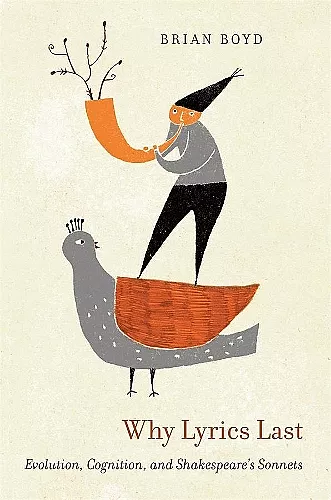Why Lyrics Last
Evolution, Cognition, and Shakespeare’s Sonnets
Format:Hardback
Publisher:Harvard University Press
Published:5th May '12
Currently unavailable, and unfortunately no date known when it will be back

The most illuminating book on Shakespeare's Sonnets since Helen Vendler's The Art of Shakespeare's Sonnets. -- Mac Jackson, The University of Auckland An impressive work of scholarship... a genuinely original and valuable addition to the substantial body of criticism of Shakespeare's Sonnets. -- Stanley Wells Boyd demonstrates how literary study can, should, and will be done in the future. -- Jonathan Gottschall, Washington and Jefferson College
Why Lyrics Last turns an evolutionary lens on lyric verse, placing the writing of verse within the human disposition to play with pattern. Boyd takes as an extended example the many patterns to be found within Shakespeare’s Sonnets. There, the Bard avoids all narrative and demonstrates the power that verse can have when liberated of story.
In Why Lyrics Last, the internationally acclaimed critic Brian Boyd turns an evolutionary lens on the subject of lyric verse. He finds that lyric making, though it presents no advantages for the species in terms of survival and reproduction, is “universal across cultures because it fits constraints of the human mind.” An evolutionary perspective— especially when coupled with insights from aesthetics and literary history—has much to tell us about both verse and the lyrical impulse.
Boyd places the writing of lyrical verse within the human disposition “to play with pattern,” and in an extended example he uncovers the many patterns to be found within Shakespeare’s Sonnets. Shakespeare’s bid for readership is unlike that of any sonneteer before him: he deliberately avoids all narrative, choosing to maximize the openness of the lyric and demonstrating the power that verse can have when liberated of story.
In eschewing narrative, Shakespeare plays freely with patterns of other kinds: words, images, sounds, structures; emotions and moods; argument and analogy; and natural rhythms, in daily, seasonal, and life cycles. In the originality of his stratagems, and in their sheer number and variety, both within and between sonnets, Shakespeare outdoes all competitors. A reading of the Sonnets informed by evolution is primed to attend to these complexities and better able to appreciate Shakespeare’s remarkable gambit for immortal fame.
The most illuminating book on Shakespeare's Sonnets since Helen Vendler's The Art of Shakespeare's Sonnets. -- Mac Jackson, The University of Auckland
An impressive work of scholarship... a genuinely original and valuable addition to the substantial body of criticism of Shakespeare's Sonnets. -- Stanley Wells
Boyd demonstrates how literary study can, should, and will be done in the future. -- Jonathan Gottschall, Washington and Jefferson College
The book showcases Brian Boyd--the Vladimir Nabokov expert and author of the well-received On the Origin of Stories: Evolution, Cognition, and Fiction--in brilliant conversation with Brian Boyd, the voluble and energetic reader of evolutionary biology. Boyd-lit offers subtle and capacious readings of the sonnets' playfulness, their ways of challenging and attracting four centuries of readers. Boyd-bio explores the affinities between the sonnets and science: from terror management theory to male mating efforts, from cognition research to Maori battle songs…The risky leaps that Boyd-bio takes are breathtaking, and open Shakespeare's art to fresh enquiry...The admirably informed Boyd-lit offers crisp and clear readings of sonnets...Boyd's valuable syntheses of literature and science range beyond those of A. N. Whitehead, beyond Nabokov perhaps, and certainly beyond the cutting remarks of scientist T. H. Huxley. -- David Gewanter * Times Higher Education *
Boyd proves a delightful guide to the sonnets' tortuous passages, artfully describing their twists and turns. He compares the sequence to a kaleidoscope that "continually taps or shakes its colored chips into new configurations" at times teasingly reminiscent of nearby sonnets. Without story to seize our attention, Boyd argues, Shakespeare--like all lyric poets--must load his lines with "more or less pure patterns of verbal form" that command our focus at the risk of exhausting it. Displaying a scholar's skill and an evangelist's enthusiasm, Boyd points out patterns sonic, semantic and imagistic...His volume marks an intriguing entry point into a line of inquiry that will surely continue to evolve, providing ever more particular reasons for our rhymes. -- Abigail Deutsch * Wall Street Journal *
[A] lively and unusual account of Shakespeare's sonnets...[Boyd] has a lot of good things to say about the details of the sonnets, much that is subtle, humanly interested, and closely observed. He writes evocatively about the confusions and ambiguities of narrative in the poems. -- Seamus Perry * Times Literary Supplement *
A most accessible book that blends the local with the vast, particularly in Elizabethan sonnets, which have the human disposition towards natty verbal patterns...Gerald Brenan once observed that "One of the marks of a great poet is that he creates his own family of words and teaches them to live together in harmony and to help one another." And Shakespeare was such a canny harmonist. Boyd has an excellent ear for the sounds and steps of this lineal family, reading the most relevant sonnets persuasively, coaxing out their innuendoes, even their resistances. -- Chris Wallace-Crabbe * Australian Book Review *
- Nominated for James Russell Lowell Prize 2012
ISBN: 9780674065642
Dimensions: unknown
Weight: unknown
240 pages